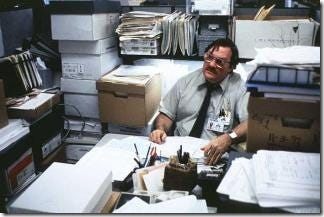Capt Worley PE
Run silent, run deep
Interesting article about how despite all the doom and gloom you hear, things are actually pretty good. Rest of the article is at: http://www.rd.com/best-of-america/cheer-up-17-reasons-its-a-great-time-to-be-alive/
“The world has never been a better place to live in,” says science writer Matt Ridley, “and it will keep on getting better.” Today, in a world gripped by global economic crisis and afflicted with poverty, disease, and war, them’s fightin’ words in some quarters. Ridley’s critics have called him a “denialist” and “shameful” and have accused him of “playing fast and loose with the truth” for his views on climate change and the free market.
Yet Ridley, 54, author most recently of The Rational Optimist, sticks to his guns. “It is not insane to believe in a happy future for people and the planet,” he says. Ridley, who’s been a foreign correspondent, a zoologist, an economist, and a financier, brings a broad perspective to his sunny outlook. “People say I’m bonkers to claim the world will go on getting better, yet I can’t stop myself,” he says. Read on to see how Ridley makes his case. Brilliant or bonkers? You decide.
1. We’re better off now
Compared with 50 years ago, when I was just four years old, the average human now earns nearly three times as much money (corrected for inflation), eats one third more calories, buries two thirds fewer children, and can expect to live one third longer. In fact, it’s hard to find any region of the world that’s worse off now than it was then, even though the global population has more than doubled over that period.
2. Urban living is a good thing
City dwellers take up less space, use less energy, and have less impact on natural ecosystems than country dwellers. The world’s cities now contain over half its people, but they occupy less than 3 percent of its land area. Urban growth may disgust environmentalists, but living in the country is not the best way to care for the earth. The best thing we can do for the planet is build more skyscrapers.
3. Poverty is nose-diving
The rich get richer, but the poor do even better. Between 1980 and 2000, the poor doubled their consumption. The Chinese are ten times richer and live about 25 years longer than they did 50 years ago. Nigerians are twice as rich and live nine more years. The percentage of the world’s people living in absolute poverty has dropped by over half. The United Nations estimates that poverty was reduced more in the past 50 years than in the previous 500.
4. The important stuff costs less
One reason we are richer, healthier, taller, cleverer, longer-lived, and freer than ever before is that the four most basic human needs—food, clothing, fuel, and shelter—have grown markedly cheaper. Take one example: In 1800, a candle providing one hour’s light cost six hours’ work. In the 1880s, the same light from a kerosene lamp took 15 minutes’ work to pay for. In 1950, it was eight seconds. Today, it’s half a second. In these terms, we are 43,200 times better off than in 1800.
5. The environment is better than you think
In the United States, rivers, lakes, seas, and air are getting cleaner all the time. A car today emits less pollution traveling at full speed than a parked car did from leaks in 1970.






















